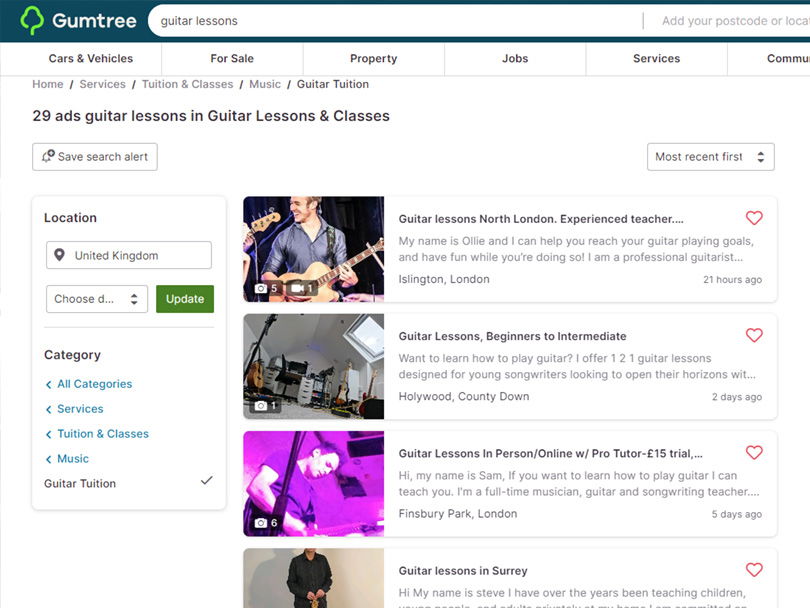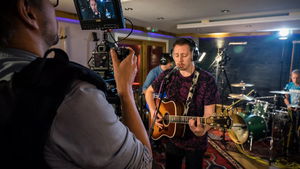
Setting up and Running a Music Teaching Business
Upon completing a degree in popular music, Andy Gallagher from funk & soul band, Beat Collective, set up a private guitar tuition business. In this article, Andy explains how he went about getting started.
After completing my BA (HONS) in Popular Music Studies, it became clear that I wasn’t going to just walk into a music related job. Gaining a reputation as a performer would take time. Contacts had to be built up, and who knew when that first big break would arrive? On top of the hard work and often luck required to make it as a performer, I would need to make sure I was booking enough gigs in for this to happen. This in itself would take a fair bit of time.
Earning A Living From Music - Teaching
I knew it was important to earn money, but I was determined to do it in a job that would make use of my degree and musical ability. The first thing I did after graduating was to start setting up my own private guitar tuition business.
Teaching an instrument is probably the easiest way of making decent money as a musician in a relatively short space of time. It requires only a handful of things to turn it into a reality; somewhere to carry out the lessons, patience, determination and some business acumen.
Finding The Right Venue
Having a venue to carry out the lessons in is obviously important (although still not essential). This could be out of your house or apartment, a church hall, a room above a music shop, or a community centre to name a few ideas. Teaching out of your own home is best as it keeps the costs down, whereas you are likely to need to hire a room elsewhere. If this is the case, it’s important to factor this into your pricing. If none of these are an option, you can always travel to pupils’ houses to carry out the lessons. Again, make sure you adjust your prices accordingly, as there’s no point doing a lesson that’s takes thirty minutes to travel to and from, for the same price you would charge at home.
Online Advertising
Once you have decided on a venue to carry out the lessons, start advertising, even if you have not prepared any teaching material. It took me about a month of advertising before my first enquiry came in, so the earlier you start promoting yourself, the better. It’s important to note that it is not necessary to spend a large amount of money promoting your business. I began by advertising for free on Gumtree, and still do to this day. When using Gumtree, remember that there is a lot of competition and they generally cover a broad area (for example, West Yorkshire). Make your adverts stand out from the rest; include photos of your setup, list in detail your experience (including any experiences you found useful while studying), sell yourself as an experienced and patient teacher.

Make sure your pricing is competitive, but don’t undersell yourself. People won’t take you seriously if you offer lessons for £9 an hour when the next advert is going for £25 an hour. I decided to start somewhere in the middle, charging £15 for a forty five minute lesson. This equates to £20 an hour, which is a decent starting wage, especially if you can get four pupils in one day – it beats working a twelve hour minimum wage shift for the equivalent payment.
Once your business takes off, you can rethink your pricing and increase accordingly. I now charge £19 for a forty five minute lesson, although I use a sliding scale, depending on the potential pupils’ age and economical situation. I also offer the first lesson as a trial, free of charge, to encourage would be pupils to turn up and go through their thoughts with them as to what they might want to learn, but are perhaps put off by the cost. This also shows you care about what they want to learn, as you can discuss ways of ensuring their favourite artists and bands are part of future lesson plans.
Local Advertising
If Gumtree is not providing a broad enough range of enquiries, take it back to the simple route. Print off some postcard sized adverts that you can put in the windows of corner shops, post offices, chip shops and music shops. I even got an enquiry after putting one in the local butchers.
Most places will ask for a small fee, maybe £1 for two weeks, but it’s worth it. This form of advertising ensures you reach your target audience, which generally speaking is local, working class people who have always wanted to learn an instrument but have never known where to start.
Lesson Plans
As you wait for the enquiries to roll in, make sure you are sufficiently prepared for when they do. This means spending a bit of time drawing up some scales, chord boxes, simple song sheets and devising a series of lesson plans, ranging from beginner to expert level of pupil.
This means when your first pupil turns up you will be able to quickly assess their ability and do a lesson accordingly. Try and do as much as possible on a computer. This makes your lessons look well prepared, which will set you apart from competitors; I have gained so many pupils from word of mouth, so impressing one pupil with your lesson plans will result in a lot more bookings coming in. Furthermore, it means you can organize your lesson plans in folders for quick access and re printing for other pupils, which saves a lot of time and stress.
Grow & Develop Your Business
Once you have taken these steps, your teaching business should begin to thrive. It will start off slowly, maybe one or two pupils a week for months at a time. However, they will start to recommend you to their friends, and so forth, and before you know it you could be up to ten or twelve pupils a week. It’s important to keep on top of the advertising. If at first you are short on enquiries, change the wording on your promotional material, add some more detail and consider adjusting your prices. Remember to price appropriate to the area you are teaching in, and consider more residential areas as opposed to city centres. Once I was earning a bit more, I asked a friend to develop a website, which gave the business more credibility and allowed me to refer potential pupils to the site, where I could go into greater detail than the advertising would allow me. This in turn means you can increase your Google ranking and try to attain pupils online. Make your lessons, plans, and advertising as professional as possible, treating it like a well run business, and who knows where it could take you.
The next instalment of these articles will focus on setting up and running a successful function band.
Written by Andy Gallagher from Backbeat - An electric group of 5 young, cool, professional musicians performing all of your favourite party classics & latest modern day hits. Guarantee to get the party started!
Photos by: Pexels/Pavel Danilyuk





